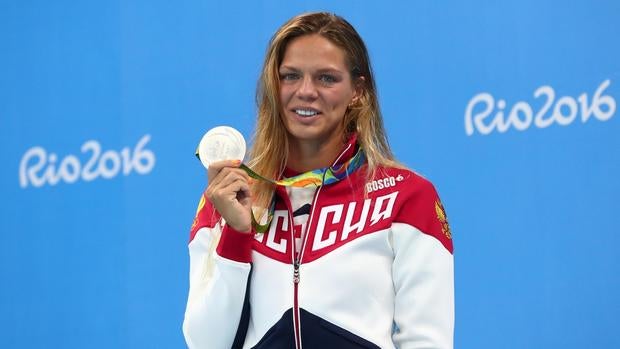Rio Olympics: Russian Yulia Efimova asks why Phelps shouldn't be banned
Yulia Efimova, who became one of the most well-known Russian Olympians among American fans thanks to outspoken, finger-wagging rival Lilly King, has been taking a lot of heat this week.
Amid winning two silver medals, including in the 100-meter breast stroke against King and the 200-meter breaststroke Thursday, Efimova continues to face criticism for previous doping violations.
Following their 100-meter clash, King noted that she felt the Russian swimmer and dopers in general should be banned for life, which seemed to win the brash 19-year-old American swimmer a lot of fans in her home country. King’s statements were also backed by legendary swimmer and USA co-captain Michael Phelps, who expressed a similar sentiment.

After completing her silver-medal-winning 200-meter swim, Efimova spoke out against those criticizing her, including King, and turned the tables with a question of her own.
“What would she say about Michael Phelps?” Efimova asked reporters during a “contentious” press conference, according to Yahoo Sports.
Efimova was alluding to Phelps’ past incidents with marijuana and alcohol. The 22-time Olympic gold medalist was once photographed while appearing to be smoking from a bong, and was arrested for driving under the influence in 2014. Phelps was suspended by USA Swimming for both incidents. He has not, however, previously tested positive for performance enhancing drugs.
Efimova went on to explain why she thought those that have tested positive in the past should be given another chance (via Yahoo Sports):
“Of course I’m not for doping, and I’ve never used it on purpose,” Efimova said. “But I know there have been very many occasions where people do it because they don’t know or because they’re stupid or naïve. There always should be another chance. When you are driving a car and break a rule, you get only a ticket. You don’t lose your license for life or get put in jail.”
Efimova has two doping offenses on her record. According to the Washington Post, one was for an over-the-counter supplement she claims she took without knowing that it included a banned substance for which she was suspended 16 months. The second time she tested positive was for meldonium, which is the drug that has been at the center of the Russian Olympic Committee’s widespread doping scandal that cost numerous athletes their previously-secured spots in Rio.
Meldonium only became a banned substance in January of this year. The World Anti-Doping Agency declined to ban many athletes who tested positive for this particular drug that can stay in a person’s system for a fairly long period of time.
Efimova may find sympathetic ears somewhere, but probably didn’t help herself by comparing performance-enhancing substances to Phelps’ prior incidents with recreational substances. Neither is particularly good, but they’re also not the same within the context of the sport.
The fact that the Russian lashed out shouldn’t come as much of a surprise. On top of the criticism heaped upon her, she has also been roundly booed at the swimming venue when she competes. Her latest comments probably won’t do much to change how she has been viewed so far at these Olympics, though.